Commentary on Deuteronomy 31:19
Bible Verse: "Now therefore write ye this song for you, and teach it the children of Israel: Put it in their mouths, that this song may be a witness for me against the children of Israel."
Introduction
The verse encapsulates a critical moment in the life of the Israelites as they prepare to enter the Promised Land. This command from Moses signifies the importance of remembrance and teaching in the faith life of the people. Renowned commentaries shed light on the multifaceted implications of this instruction.
Contextual Background
Understanding the context of Deuteronomy is essential. It is the final book of the Pentateuch, representing Moses' farewell speeches to the Israelites. The significance of Moses’ impending departure and the transition to a new era under Joshua amplifies the need for remembrance encapsulated in this song.
Insights from Matthew Henry
Matthew Henry emphasizes the dual purpose of the song commanded by Moses. He notes that it serves as:
- A Reminder: The song is to remind future generations of God’s faithfulness and the importance of obedience.
- A Witness: It acts as a testimony against them should they stray from God’s commandments, thereby underscoring the moral accountability of Israel.
Henry also comments on the necessity of teaching and memorizing this song, which serves to root the truth in the hearts of the children of Israel. It speaks to the broader biblical theme of oral tradition and the role of songs in cultural and spiritual formation.
Insights from Albert Barnes
Albert Barnes provides a more interpretive angle, discussing the implications of “writing a song.” He reflects on:
- The Permanence of God’s Word: Writing is an eternal act; thus, the song will have a lasting impact.
- The Educational Aspect: Teaching the children ensures that the wisdom of the past is transmitted to the future, reinforcing the importance of faith education.
Barnes highlights the need for Israel to remember their covenant responsibilities and how this song will serve to remind them of their identity as God’s chosen people.
Insights from Adam Clarke
Adam Clarke provides a lexical analysis of the terms used in this verse. He elucidates the meaning of 'song' within the cultural context of ancient Israel, suggesting that:
- Expression of Theology: The song encapsulates Israel’s history and covenant with God, making theology accessible through music.
- Cultural Relevance: Songs were a significant part of worship and communal life, acting as both a teaching tool and a means of expressing emotions.
Clarke further stresses that by teaching this song, Israel’s leaders were to establish a form of collective memory that reiterates their commitment to God and His statutes.
Theological Implications
In synthesis, Deuteronomy 31:19 has profound theological implications:
- Covenantal Memory: The song is a reminder of the covenant between God and Israel, emphasizing the need for faithfulness to His laws.
- Intergenerational Responsibility: It underscores the responsibility of each generation to teach the next about God’s works and His commands.
- The Role of Worship: The integration of worship and instruction in the lives of believers is highlighted, revealing the importance of arts in spirituality.
Practical Application for Today
For pastors and theologians, the insights gleaned from Deuteronomy 31:19 encourage:
- Active Teaching: Engage congregations in teaching and remembering God's works in their lives; utilize hymns and songs to foster faith.
- Incorporating Historical Context: Emphasize the significance of history and tradition in present-day worship settings.
- Encouraging Personal Reflection: Inspire believers to write their own “songs” or testimonies as a reflection of their faith journey.
Conclusion
Ultimately, Deuteronomy 31:19 serves as a foundational principle in the practice of faith, highlighting the need for remembrance, education, and worship. The commentaries of Henry, Barnes, and Clarke collectively stress the importance of this song as a living testament to God’s faithfulness and an instrument for spiritual formation across generations. Such insights remain ever relevant for today’s church, as they call for a committed and intentional approach to discipleship and worship.


